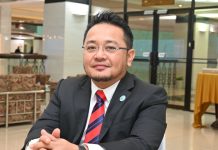KOTA KINABALU: The State Government fully supports the strengthening of the Technical and Vocational Education and Training (TVET) ecosystem to ensure Sabah youths are competitive in the job market and no longer trapped in the unemployment cycle.
Chief Minister Datuk Seri Panglima Haji Hajiji Haji Noor said the establishment of the Sabah TVET Council in May this year was a significant paradigm shift in the state’s TVET development landscape.
He reiterated that TVET must no longer be viewed merely as a choice.“Instead, it must gain traction as the mainstream education choice in the bid to produce a skilled workforce that can create Sabah’s future.
TVET is not just about providing technical skills as it empowers individuals, creates job opportunities, and acts as a catalyst for the state’s economic growth,” he said at the Sabah TVET Symposium at the Magellan Sutera Harbour here today.
His speech was read by Deputy Chief Minister II/Minister of Local Government and Housing Datuk Seri Panglima Dr Joachim Gunsalam.
Hajiji said the State Government recognised that technical and vocational skills are fundamental to the development of the state, which is endowed with diverse potential from natural resources, the oil and gas sector, agriculture, tourism and manufacturing.
“However, to sustain the growth of these sectors, we need a highly skilled workforce that can meet the demands of rapidly developing industries in the state,” he said in this context, the Chief Minister emphasised the crucial role of parents and the community.
“The State Government urge youths to consider TVET as a primary option, not merely an alternative, in planning their future. TVET should be seen as a wise choice that can produce future professionals, entrepreneurs, and innovators.
“Sabah’s youth must seize the opportunity to pursue TVET, as the courses offered today are aligned with current job market demands, thereby ensuring the employability of graduates,” he said.
He added that in the era of the Industrial Revolution 4.0 and the wave of digitalisation, skills in technical fields, automation, and artificial intelligence (AI) are valuable assets.
“If Sabah’s youth are not equipped with these skills, we will be left behind in this wave of change. Therefore, TVET is the best platform to build a highly skilled workforce that will drive Sabah’s advancement,” he said.
The Chief Minister said the government’s commitment to human capital development is evident through various initiatives and investments.
“Our efforts are now beginning to bear fruit. Recent statistics show that Sabah’s unemployment rate has decreased from around 8.2 per cent in 2021 to 7.5 per cent in 2023.
“Although this figure remains high compared to the national unemployment rate, the downward trend is encouraging and reflects the effectiveness of the government’s various economic and human capital development initiatives,” he said.
However, he said that based on Department of Statistics data, Sabah is facing challenges, with more than half or 58.6 per cent of the unemployed in Sabah being youths aged 15–24, while 55.8 per cent of the total unemployed individuals have only completed secondary school education.
“These figures indicate that many youths need skills training and further education to improve their employability,” he said.
Therefore, the symposium, themed ‘Sustainable TVET for Sabah’s Future Human Capital: Integrated TVET Ecosystem’ is highly relevant to the current needs of the state of Sabah, he said.
Hajiji hoped that the participants would use the opportunity to establish a network between educational institutions and industry training during the two-day symposium.-pr/BNN





